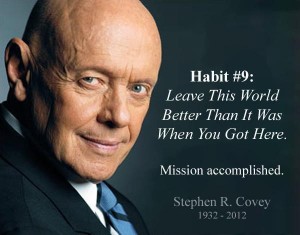 Stephen Covey made me really mad twenty years ago and it’s only recently that I’ve come to realize that he was right, I was wrong, and I owe him an apology.
Stephen Covey made me really mad twenty years ago and it’s only recently that I’ve come to realize that he was right, I was wrong, and I owe him an apology.
Covey, of course, passed away a few days ago, and so I clearly missed the opportunity to express my mea culpas while he still was alive. The good news is he never knew I was upset; I never actually told him. But, in my heart, I still feel compelled to share the story (maybe he can read this where he is) and (if not) hope very much that it will be of great help to you.
It was 1991. The 60-year-old bank where I was working had just suffered some massive loan losses, and the future of the firm suddenly was in peril.
It was a peculiar company in the sense that many of the people working there – my wife and best friends included – really had never worked anywhere else. We’d begun our careers there in our early twenties, and hadn’t yet had enough life experience to know that banks could fail, people could lose jobs, life was inherently uncertain and, despite it all, we would be ok. So, when news came out that our stock price had plummeted and more big losses were imminent, a lot of us descended into fear.
Our bank had an annual meeting where every manager in the firm was invited. It was part of my responsibilities to plan and execute this event – and that included the selection of a keynote speaker. In light of the sudden change-of-fate the bank was experiencing, I decided we needed a presenter who could lift us up. Someone who would inspire us to believe we could turn things around and to keep our hopes high.
Working with a speaker’s bureau, I hired Stephen Covey to come speak; but there was one caveat to the selection. I wanted to have a conversation with him prior to the event, and to share my intentions for the meeting and lay out my expectations for his address. Covey willingly agreed to meet, and we had an almost hour-long chat. When we were done, I was absolutely certain he knew I wanted the most upbeat speech possible.
Covey didn’t waste a minute of his speech before annoying me. Acknowledging our bank’s setback, he immediately launched into the story of Victor Frankl, a German Jew imprisoned in Nazi death camps “where he experienced things so repugnant to our sense of decency that we shutter to even repeat them.” Covey told the audience that Frankl was mercilessly tortured, never knew moment-to-moment what his fate would be, and suffered through the deaths of his parents, brother and wife – most in the gas chambers.
Honestly, I wasn’t mature enough at the time to understand why Covey thought such a distressing story could some how restore our spirits. In light of our recent conversation, I perceived his tale to be a complete downer, and I think I mostly tuned out the rest of what he had to say.
But here’s what Covey did go on to express, and why it was so relevant to all of us listening.
Despite all the massive indignities and losses Frankl suffered – and they were many – he came to realize that he could decide within himself how his experience would affect him. “He had the power to choose his response.” “Between stimulus and response, man has the freedom to choose”
Referencing all that happened to Frankl, what Covey wanted us to realize is that no situation is ever so dark that we can’t control our feelings, look for alternatives and put our energies into new courses of action. Had I really been listening, I would have heard Covey share an idea that could have helped me more successfully navigate through the future death of my bank, along with scores of future setbacks. It’s not what happens to us, but our response to what happens to us.”
For weeks after the conference, when the bank’s future remained dark and unknown, my best friend and I would meet every Sunday and go for a long run. He worked at the bank (and apparently didn’t listen to Covey either) and all we did was bring each other deeper into fear through our chatter. “What if I can’t find a new job? “How will I be able to keep my house?” “I don’t want to have to move out of San Diego.” “We’re all going to die!”
“What matters most is how we respond to what we experience in life.” This is what Steven Covey went on to say and he was spot on right.
Sadly, much of the greatest wisdom we all acquire comes from our own life experiences (hard-earned wisdom), rather than from the good intentions of those who’ve already learned it and seek to prevent us from pain. Noting this, I hope you’ll listen to me when I say, your life will be so much happier and successful if you purposely choose to not feel miserable when things don’t go your way (which is a whole lot of the time). This is particularly empowering advice when you’re leading a lot of other people, too.
We’re always honored when you forwarded these blogs on to friends, colleagues and arch-enemies. We’ll send these to you directly if you’d like (sign up here) and promise to never sell your information or call you to sell insurance.
PS: After this article was posted, all of the social media counters on our website mysteriously reverted to zeros — and all historical share counts were lost. All links now are working!
